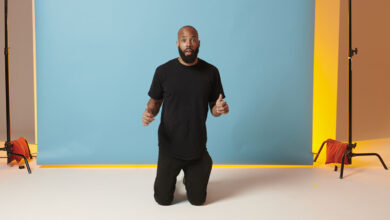3 Ways Photographers Sabotage Their Own Careers

As a professional photographer, you must face all sorts of obstacles. But the highest hurdles tend to be those you put in your own way.
It’s not easy to be a professional photographer. It never has been. It never will be. Technology, which has promised to ease the job of the photographer by lowering the bar to entry into the industry, has also made it more difficult to make a living once inside. Economic factors outside of the photography industry drive changes within it. And many of the shifts in our careers are, as much as we’d like to deny it, beyond our control.
But there are a few things that are still within our control. And we are still running a race that can be won. There’s no way we can stop the world from slinging arrows in our direction. But there are a few unforced errors common to almost all photographers that we should do our best to avoid.

Overspending
Photography is a strange business to be in. In most business startups, you start with a certain level of fixed costs, factor in variable costs, then identify your breakeven point and revenue targets accordingly. Running a photography business is much the same. The notable difference, however, is that in a photography business, or just about any creative field, revenue can vary wildly.
If you are a company that manufactures widgets and you have contracts with factory clients who buy X number of widgets per month, then you have an easily identifiable revenue number you can expect each month and can plan expenses accordingly. Conversely, if you are a commercial photographer whose income depends on a rolling collection of one-off campaigns that may come in bunches or may not come at all, predicting your monthly revenue can be difficult. There are other working methods, of course. Perhaps you work in-house for a company. Or perhaps you have a standing contract with a client to provide e-commerce services or something like that. There are all manners of client deals. But, taking the most common example, there’s no such thing as a fixed monthly income for most freelance artists.
But, at the same time, there are still certain fixed costs. Perhaps you have a studio you rent. You’ll have to pay for your website and marketing expenses. You’ll need to factor in your personal living expenses, food, healthcare, etc., which unfortunately don’t go away just because the business is a little soft. Then, there’s the investment in gear. And I’m proud to say, this is finally one area where we are in control.

Of course, we don’t always remember that. It is very easy to convince ourselves that our main job as photographers is to buy new cameras. If we listen to camera manufacturers and influencers, you can’t even officially call yourself a photographer if you don’t own the latest and greatest camera. Heaven forbid you are already making beautiful images without the use of the most up-to-date technology. You might as well just give up now. Nonsense.
Wasting all your time and money trying to keep up with the latest technology, while great for retailers, is a surefire way to spend yourself out of business.
Now, I’m not saying that it’s stupid to upgrade your gear. But, be honest. You know the difference between when you need to upgrade your gear versus when you just want to upgrade your gear. I’m speaking from personal experience. I absolutely love my current kit, so much so that it’s hard to fathom ever needing anything more. But, if I’m being honest, the kit I had seven or eight years ago was also perfectly adequate for the vast majority of the things I need to do as a professional photographer even today. Would there be some drawbacks and inconveniences? Yes. But could I still create the images I do today with my old system? Well, yes.
Again, I love my current setup, so aside from a thought experiment, that statement doesn’t mean much. But it does mean something when one looks back at the amount of money spent to acquire my current dream kit. It matters more when one compares that as a percentage of revenue generated over the same period. Don’t get me wrong; in terms of the selection of gear, I’ve made the right choices. But were those investments financially necessary? Maybe not.

Part of the quandary is that we often feel the need to invest in gear and other areas before we know if there will be any assignments coming in the first place. We want to be ready and sometimes make the mistake of thinking people are hiring us for our gear as opposed to our vision as artists. But because of the invest-first, recoup-later approach, it can be very easy to get out ahead of our skis. Then, when we do finally start booking that work, we are bringing in money but starting behind the 8-ball because of already sunk costs.
A smarter approach, though one that requires a far greater degree of self-discipline, is to base investments on revenue already generated rather than projected revenue. This might mean that you’ll need to rent gear for a while or that you’ll just need to stick with your 10-year-old camera a little longer, but it also means that when you are making purchasing decisions, you are not mortgaging future income to do so. Instead, now that you already have cash on hand, you can make a more strategic analysis of how much of that cash on hand you would like to reinvest in your business on gear or other expenses.
In other words, rather than make speculative investments based on the jobs you wish to come in, make grounded investments based on work already performed. This will likely lead to you purchasing far fewer cameras. But it will also ensure that your cash flow stays positive to help you weather the storm of inconsistent revenue.

Undervaluing/Overvaluing Your Work
I realize the title of this section may seem like an oxymoron. How can one simultaneously undervalue and overvalue their work? Well, at points in all of our careers, we tend to do both.
We work in an oversaturated industry. We have clients that don’t always inherently value our work. And there is a constant stream of new entrants into the industry willing to work for free. Because of all this, there is a constant downward pressure on rates. Why would a client pay you this much when they can get that new kid on the block to do it for half of that? It doesn’t matter that the new kid on the block will soon realize that he can’t actually make a living charging that rate. The client doesn’t care. This is capitalism, and their job is to get the product they need for the lowest possible price.
So then, one month when your cash reserves are running low, you decide to take that job that is paying you well below your established day rate. You justify it because, hey, we all have to eat. You try to tell yourself that the same client will hire you again and be willing to pay you a fair wage next time. But why would they? You’ve already proven you are willing to waver on your value before, so why would they be willing to offer a single penny more?

We undervalue our work for a litany of reasons. When starting out, we often undervalue our work just because we don’t know any better. That new kid on the block isn’t actively trying to undercut the foundation of an industry; he just doesn’t know yet what he should be charging and is easy to take advantage of. Other times, we know full well what we should be charging, but are too afraid to stick to our guns. We fear that we will scare clients away by demanding a fair wage. So we end up taking the bullet rather than rocking the boat. Maybe we make a bit of money, but in the long run, it’s not enough to run a sustainable business. And even if the job goes well, it’s hard to shake the feeling that both the client and we have undervalued our contribution.
At the same time, we can overvalue ourselves. Not overvalue in the sense that we think our work is better than it is. Rather, overvalue in the sense that we can lose sight of why we are being hired in the first place. Yes, you are an amazingly talented photographer, and all of your images are worthy of the Louvre. But your client is hiring you to shoot their campaign because they have a product that needs to be sold. Yes, you are good. But you’re there to provide a service and help them sell shoes. Your ability to effectively produce a shoot and provide them the assets they need is just as important as your ability to master butterfly lighting. So it’s not to say that your aesthetic skill doesn’t matter. Only that your job as a professional photographer is to provide a service.
Putting both the idea of undervaluing and overvaluing work together gives us a new perspective. Yes, we are being hired to provide a service to our clients. But that also means that we are providing a value to our clients and deserve to be adequately compensated for that value. Your client certainly isn’t giving away their end product for free. So why should you? One shouldn’t lose sight of why clients are hiring us in the first place. But we must also not lose sight of the value we bring to the project.

Paying Too Much Attention To The Competition
My Instagram usage has really fallen off. This is for a multitude of reasons, but it started sometime during the pandemic. I’d always made frequent Instagram posts a major pillar of my customer outreach efforts. I wouldn’t say that my clients would discover me on Instagram. But my carefully curated list of followers largely consisted of people I’d done business with or met who I wished to engage with my work on a consistent basis. Even if it was just casually seeing my Instagram posts pop up in their feed. Also on the list of people that I follow or who follow me are a number of other photographers and photographic groups. Social media is great in that way. It allows you to stay in contact with a larger pool of people than I would likely otherwise were social media not a thing.
But that’s pretty much where my love of social media ends. Now, I don’t want to go off on yet another old-man rant about how social media is ruining society, but I think we can all agree that social media has its downsides. While I was forced to use it to promote my business, being on social media also forces you to see a constant stream of what your competitors are doing. And, since virtually no one posts their failures on social media, what you see is a steady stream of other people’s wins. Don’t get me wrong; I’m happy for everyone who does well. But comparing your real life to everyone else’s highlight reel is a quick way to foster your own sense of inadequacy.
Even if your business is doing great, objectively speaking, it is still going to stick with you when you see a steady stream of your colleagues doing even better. Suddenly your wins, of which you should be incredibly proud, don’t seem so important. Suddenly that image you posted, which you couldn’t wait to show, doesn’t seem so great when you notice how many more likes so-and-so got on their latest post from their exotic photoshoot with that celebrity. It’s a stupid thing to concern oneself with. But it’s human nature. This is why every day there’s a new report about the damaging mental health effects social media is having on young people. Just because I am now one of the “olds” doesn’t mean that I am any less susceptible to the doom scroll.

This got particularly bad around the time of the pandemic. Suddenly trapped in my house, my Instagram usage only increased. Eventually, I started to identify the truly harmful effects it was having on my psyche in an already difficult time. Pretty soon, just getting onto Instagram at all had grown to be a painful experience. So, after years of dogmatically posting every single day, I went off the platform for several months. How was it? It was glorious. As if by magic, many of the mental health effects began to recede. I found my positivity returning. Life just felt better without constantly being confronted with the myriad of ways that I was falling short.
No, let’s be clear. I wasn’t falling short. Objectively speaking, I was doing just fine. But I had been making the mistake of judging my own value based on what other people were doing. And no matter who you are, judging your own worth based on others’ successes is a losing formula. There will always be someone doing “better” than you. There will also always be someone doing “worse” than you, although you’re not likely to see that on social media.

Constantly comparing yourself to others, especially without context, is an easy way to blunt your own momentum. Sure, that person might have just shot a big gig, but you have no way of knowing how long it took them to get to that point. You don’t even know the circumstances that came together to get them the shoot in the first place. Was their work objectively better than yours? Or was their marketing better than yours? Or did they just happen to meet the right connection that put their name forward instead of your own? And, vice versa. Just because you booked a major assignment, does that mean that you are objectively greater today than you were the day before when you were screaming at the wind about the lack of work? Are you somehow more valuable than the next person just because things are going your way at the moment? What about next year when your business has slowed just at the same time your competitors’ has picked up?
Defining our self-value based solely on our own journey can be a challenge. It’s only human to try and compare your progress to the man standing next to you in line. But ultimately, our goal as artists and as human beings is to be the best version of ourselves—not to try and prove to the world and our ego that we are objectively better than everyone else. First of all, that’s impossible to objectively measure. Second of all, that way of thinking is a one-way trip to a sense of failure. Instead, judge your own progress on your own terms. Stop wondering if you’re the best. Just try to be the best version of yourself.




